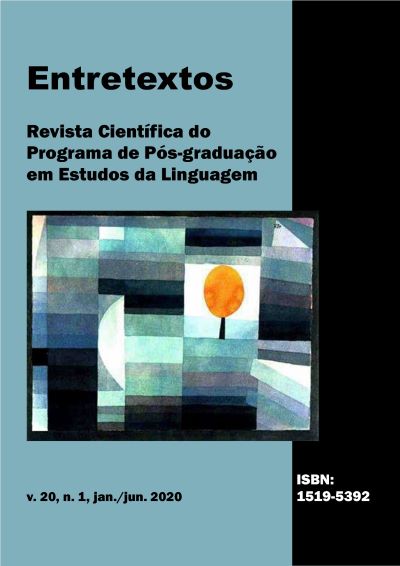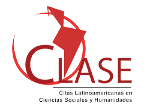El consenso entre las voces dialógicas de las DCNs para el uso de tecnologías digitales en la formación docente
DOI:
https://doi.org/10.5433/1519-5392.2020v20n1p213Palabras clave:
Bakhtin. Tecnologías digitales. Discurso normativo género. Relaciones dialógicas. Formación del profesorado.Resumen
Esta investigación tiene como objetivo analizar cómo ocurre la formación del profesor en el ámbito de trabajo con tecnologías digitales y proponer algunas bases para una propuesta de enseñanza de estas tecnologías a la luz de las reflexiones de Bakhtin y su Círculo. Para esto se centra en la caracterización de un documento normativo oficial como un género de discurso y en la verificación del modo en que se establecen las relaciones dialógicas para el tema presentado. Su metodología es de cuño cualitativo y bibliográfico. Nuestra investigación se orientó por la perspectiva metodológica de Bakhtin y su Círculo, respaldada por la amplia concepción de los enunciados, los géneros del discurso, las esferas y el diálogo, así como en los trabajos de sus comentaristas, tales como: Faraco (2009), Brait (2005, 2016 ), Grillo (2016), Marchezan (2016) y Fiorin (2017). Se comprobó que el discurso de la Resolución refleja y refracta la voz de una esfera pública de alta educación (MEC / CNE / CP), así como también circula y se consume en las esferas educativas de la formación docente y escolar. Las voces de los autores son de los sujetos activos en el discurso, quienes, al enunciar, se dirigen a sus interlocutores, que son las instituciones de educación superior (IES), y a los sujetos en formación docente y escolar. El contexto enunciativo de la Resolución CNE / CP 2/2015 asume el papel de capacitar a los docentes para la educación de calidad y contemporánea, ya que hay varios puntos en la declaración de que los enunciadores están preocupados al respecto de la implementación de recursos de tecnología digital en los ambientes de formación.
Descargas
Citas
BRAIT, Beth (org.). Bakhtin: outros conceitos-chave. 2. ed. São Paulo: Contexto, 2016.
BRAIT, Beth. Bakhtin e a natureza constitutivamente dialógica da linguagem. In: BRAIT, Beth (org.). Bakhtin, dialogismo e construção de sentido. Campinas: UNICAMP, 2005. p. 87-98.
CONSELHO NACIONAL DE EDUCAÇÃO. Resolução CNE/CP nº 02, de 01 de julho de 2015. Diretrizes Curriculares Nacionais para a formação inicial em nível superior e para a formação continuada. Brasília, DF: MEC/CNE, 2015. Disponível em: http://portal.mec.gov.br/index.php?option=com_docman&view=download&alias=17719-res-cne-cp-002-03072015&category_slug=julho-2015-pdf&Itemid=30192. Acesso em: 25 out. 2018.
CURY, Carlos Roberto Jamil. Conselhos de Educação: fundamentos e funções. Revista Brasileira de Política e Administração da Educação, Porto Alegre, RS, v. 22, n. 1, p. 41-67, 2006. Disponível em: http://seer.ufrgs.br/index.php/rbpae/article/view/18721/10944. Acesso em: 9 de julho de 2018.
FARACO, Carlos Alberto. Linguagem e diálogo: as ideias linguísticas do círculo de Bakhtin. São Paulo: Parábola, 2009.
FIORIN, José Luiz. Introdução ao pensamento de Bakhtin. 2. ed. São Paulo: Contexto, 2017.
GRILLO, Sheila Vieira de Camargo. Esfera e campo. In: Bakhtin: outros conceitos-chave. 2. ed. São Paulo: Contexto, 2016. p. 133-160.
MARCHEZAN, Renata Coelho. Diálogo. In: BRAIT, B. (org.). Bakhtin: outros conceitos-chave. 4. ed. São Paulo: Contexto, 2016. p. 115-131.
RESOLUÇÃO. In: FERREIRA, Aurélio Buarque de Holanda. Dicionário Aurélio básico da língua portuguesa. Rio de Janeiro: Nova Fronteira, 1988. p. 566.
Descargas
Publicado
Cómo citar
Número
Sección
Licencia
Entretextos adota a Licença Creative Commons Attribution 4.0 International, portanto, os direitos autorais relativos aos artigos publicados são do/s autor/es.
Sob essa licença é possível: Compartilhar - copiar e redistribuir o material em qualquer suporte ou formato. Adaptar - remixar, transformar, e criar a partir do material, atribuindo o devido crédito e prover um link para a licença e indicar se mudanças foram feitas.






















